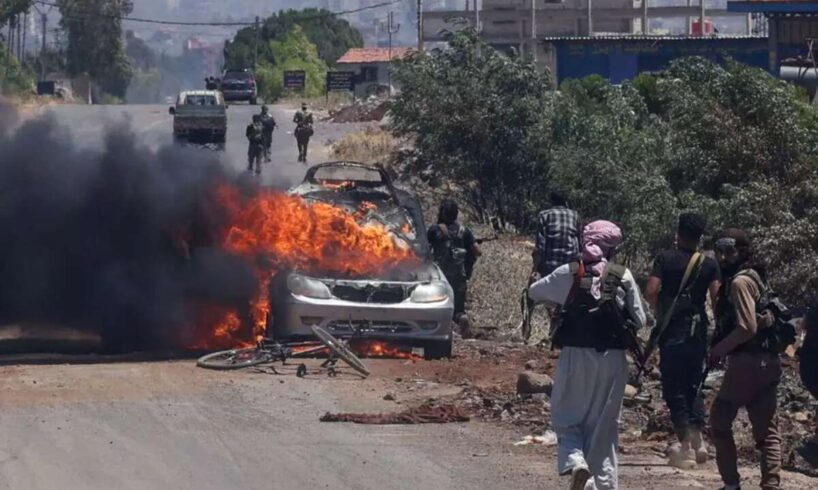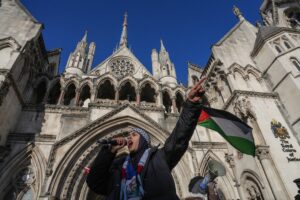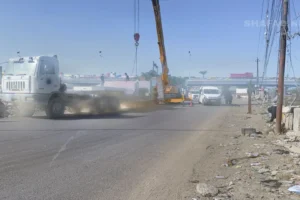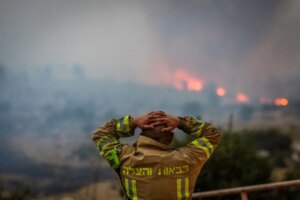
Over the weekend, Israeli attention swung from Sweida to Gaza: from concern for the Druze and the risk of escalating entanglement in Syria, to worry over the hostages and the near-daily fighting in the Strip. Despite reports late Thursday night of a ceasefire in southern Syria, the clashes in fact continued into Saturday and Sunday. Pro-regime forces loyal to President al-Sharaa were replaced by Bedouin tribes who stormed Druze villages, especially the key city of Sweida.
Distress calls from Druze leaders in Syria and Israel, along with fears that the border fence could again be breached, led to a dramatic Israeli U-turn: just over 24 hours after striking regime forces, including in Damascus, and demanding their immediate withdrawal from the south, the Israeli government made an urgent appeal to al-Sharaa to redeploy his forces to act as a buffer between the Druze and the Bedouin. Israel insisted that any troops sent to the south be ununiformed and unarmed with heavy weapons, but the zigzag reflects both the fragility of the situation and the lack of a clear policy in Jerusalem.
Regime forces in Sweida. Photo: AFP AFP
Israel has two immediate concerns. First, the Druze community, which has already suffered dozens, possibly hundreds, of fatalities in the assault on Sweida, amid horrific reports of abuse and executions. Second, the potential for a major influx of Bedouin into the area, destabilizing security in southern Syria and potentially also in Jordan, which is ruled by a widely disliked Bedouin minority. The fear of a domino effect that could bring down the regime in Amman and see it fall to ISIS sympathizers is what prompted the attempt to use a third party (the Syrian regime) to separate the warring sides.
But Israel may need to go even further. Last week’s events make clear that the Syria, and, by extension, the wider eastern front, is extremely volatile. It’s unclear whether al-Sharaa’s regime misunderstood Israel (as Washington claims), is simply unable to enforce control (as Jerusalem believes), or is deliberately manipulating all sides (as some intelligence sources suspect). The deep, literal and figurative, bloodshed among the Druze, Bedouin and Sunnis guarantees that the next round of fighting is only a matter of time.
Syrian leader Ahmed al-Sharaa. Photo: Reuters Reuters
Israel must define its goals in the region. Three main objectives stand out: first, to push back threats from its borders, primarily through military presence and targeted strikes on hostile actors. Second, to protect its broader strategic interests, from the stability of Jordan’s monarchy to countering Turkish and Qatari influence in Syria. Third, to defend its Druze allies. All these efforts must be coordinated with Washington and informed by constant scrutiny of al-Sharaa’s movements and meetings.
Meanwhile, eyes are fixed on Gaza, where American mediator Steve Witkoff’s expected arrival in Doha could signal progress toward a deal that would see 10 living hostages and 15–18 bodies returned in exchange for a ceasefire and the release of Palestinian prisoners. Despite reports, some stemming from Israeli sources, of deadlock in the negotiations, there is a sense that both sides currently want an agreement, each for its own reasons. If Witkoff can again corner both parties, as he did in January, a deal could be struck within days.
Until that happens, Israel must stay vigilant in Gaza. The rising toll of wounded Israel Defense Forces soldiers points not just to Hamas’s shift to guerrilla tactics, but also to growing fatigue and attrition among Israeli troops. This could lead to operational mistakes and unintended civilian casualties.
Gazans seen with a humanitarian aid truck in the Strip. Photo: AFP AFP
Yesterday brought more reports of multiple casualties near a food distribution point in southern Gaza, part of a pattern that has already left dozens dead in recent weeks. Along with the recent strike on a church, these incidents are fueling Israel’s worsening legitimacy crisis on the world stage, raising fears of real diplomatic or legal repercussions.
Israeli Channel 12 reported Friday night that Mossad chief David Barnea visited Washington last week to push US officials to support a “voluntary emigration” plan for Palestinians to third countries in Africa and Asia. Though the idea originated with President Donald Trump, it remains uncertain whether it will be implemented, but Barnea’s apparent willingness to tackle any assignment should raise eyebrows.
Four final notes
First, on Iran. Late last week, American media continued to debate the scope of damage inflicted by the Israeli-American strike on Iranian nuclear facilities. High-ranking, credible Israeli officials asserted that the operation significantly hit all sites and delayed the Iranian nuclear program by at least 18 months. They added that Tehran’s regime is now deeply engaged in internal deliberations and has yet to decide its next steps.
Second, the fuss around a US report alleging that American funds helped finance anti-government protests in Israel, a claim based partly on fringe sources, is especially strange coming from allies of a prime minister who received money from Qatar and openly welcomes foreign meddling in his criminal trial.
US Ambassador to Israel Mike Huckabee at the Western Wall. Photo: Oren Ben Hakoon Oren Ben Hakoon
Third, in Judea and Samaria (the West Bank), Israelis may be ignoring the lawlessness there, tacitly enabled by far-right government figures. But the harsh criticism voiced yesterday by pro-Israel US Ambassador Mike Huckabee during his visit to the village of al-Taybeh should set off alarm bells. While attention is fixed on Syria and Gaza, the West Bank is turning into a major headache, not only because of Palestinian terrorism.
Fourth, a word about Giora Epstein, one of the Israel Air Force’s greatest fighter pilots and the world record-holder for most enemy aircraft shot down, who died yesterday at 87. Epstein deeply loved Israel and was a fearless warrior and visionary. In his later years, he took pride in the air force’s extraordinary achievements against Iran. Yet during last year’s protests, in which he took an active part, he had to endure disgraceful attacks from government ministers against the very pilots, including himself, whose cockpit bravery and practical Zionism far outweighed anything their critics had ever shown.





